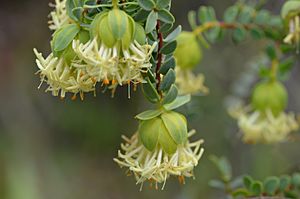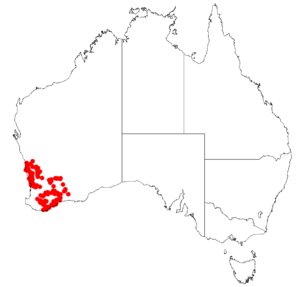Yellow banjine facts for kids
Quick facts for kids Yellow banjine |
|
|---|---|
 |
|
| Scientific classification | |
| Genus: |
Pimelea
|
| Species: |
sulphurea
|
 |
|
| Where Pimelea sulphurea grows in Australia | |
| Synonyms | |
|
Banksia sulfurea (Meisn.) Kuntze |
|
Pimelea sulphurea is a special plant that belongs to the Thymelaeaceae family. People sometimes call it the Yellow Banjine. It's a small shrub found in Western Australia.
What it Looks Like
The Yellow Banjine is a small bush. It usually grows to be about 15 to 60 centimeters tall. Its stems are smooth.
Leaves and Flowers
The leaves of this plant are shaped like ovals or circles. They grow directly on the stem without little stalks. Each leaf is about 2 to 16 millimeters long and 1.5 to 9 millimeters wide. Both sides of the leaves are smooth. They are usually green or a bit bluish-green.
The flowers of Pimelea sulphurea grow in a bunch that hangs down. These flowers are bright yellow. Most of the time, the flowers have both male and female parts. But sometimes, you might find flowers that are only female. The outside of the flowers feels a bit hairy, while the inside is smooth. This plant usually blooms, or flowers, from July to November.
Where it Lives
This plant likes to grow in sandy areas. You can often find it in woodlands or shrublands. These are places with lots of trees or bushes.
Where it Grows
Pimelea sulphurea is found in the southwestern part of Western Australia. It grows in several different natural areas. These include places like the Avon Wheatbelt, Coolgardie, and the Swan Coastal Plain. It also grows in the Esperance Plains, Geraldton Sandplains, Jarrah Forest, and Mallee regions.
How it Got its Name
The plant was first officially described in 1848 by a scientist named C.D.F. Meisner. Later, in 1852, another scientist named Walpers gave it a different name, Calyptrostegia sulphurea. This name is now considered an older, less used name for the plant. In 1891, Otto Kuntze tried to put Pimelea plants into the Banksia group. Because of this, he incorrectly called it Banksia sulfurea. But the name Pimelea sulphurea is the correct one we use today.

